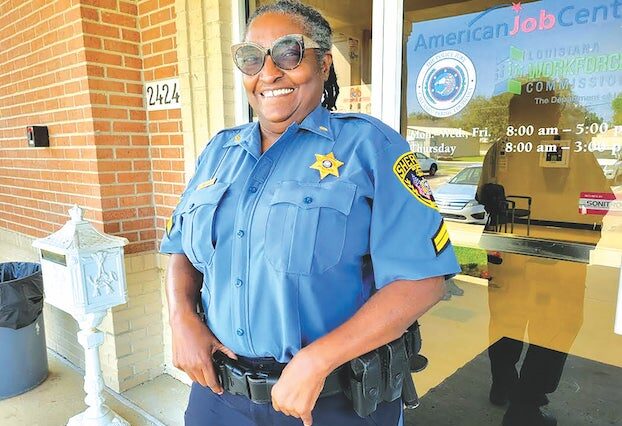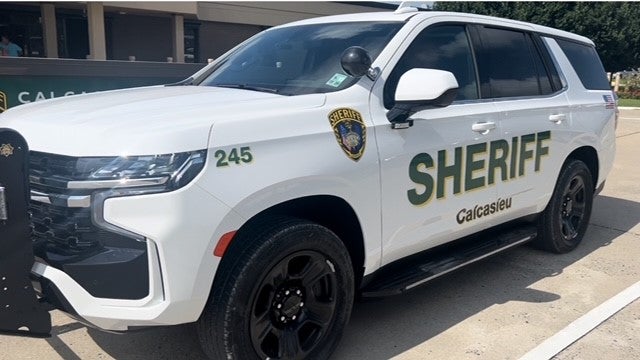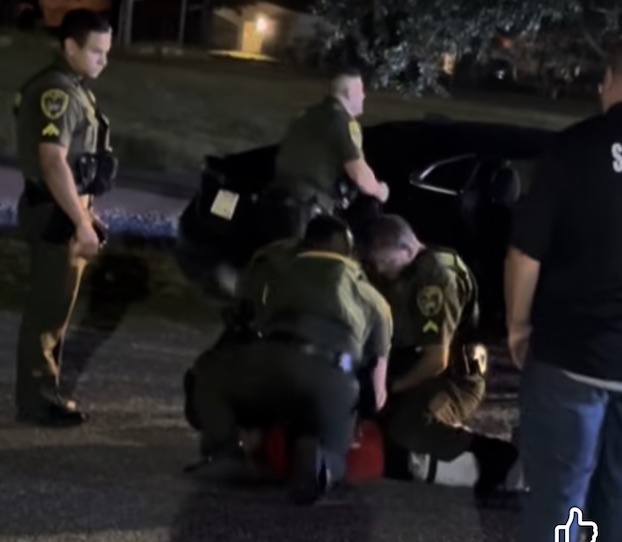Vinetta Celestine reflects on lifetime in law enforcement
Published 8:12 am Tuesday, March 26, 2024

- Vinetta Celestine
There was a time when 64-year-old Vinetta Celestine would have chafed at the job she has now. It’s a nine-to-five day gig, in a comfortable environment.
In the early 1980s, at the Sulphur Police Department, the McNeese State University graduate wanted to be on patrol, in the thick of things, making a difference. It took some doing, but after three-and-a-half years, she got her chance. Her career spanned 29 ½ years, five mayors, five police chiefs and saw her as head of detectives dubbed “The Fab Five.” Like many young people, her ambition was “to save the world.”
Her father was a self-employed carpenter. Her mother, a homemaker and the family disciplinarian. Celestine had three brothers, two older and one younger. She was a tomboy, and some of the toughness she called on later in life was developed scrapping with brothers.
The family did not miss a church service, and their home was open for Monday night prayer meetings with extended family.
George Serice, owner of Serice’s of Sulphur, was often a guest in the Celestine home. Her father did a lot of work for him. The kids called him Uncle George. The year the schools desegregated, Celestine was in the fourth grade. The transition was smooth. It wasn’t until the ninth grade that she saw racial injustice up close.
“It was a total shock,” she said. “I had always gotten along with everybody.” Up until that time, she judged people as her father advised, not by the color of their skin, but by what was in their hearts.
“It was the final day of class. We were walking home. One of the Black guys from the neighborhood got in a fight with one of the cowboys. Soon, others jumped in, including Celestine.
“The day we went back to get our report cards, we were walking home and this guy’s family and friends came to jump on all of us. The policeman stopped the black kids from coming from the quarters – we called it – and they let the cowboy’s family and friends come in and they beat the guy up really bad.. He had to go to the hospital. I was like, I can’t believe they did that.”
That’s when she started paying attention, she said, and she was paying attention when her teacher, Ms. Young took the ninth grade civics class to a court hearing.
“That was the first time I had seen anyone in cuffs, and I’m not saying those in cuffs had not committed crimes and should not have been wearing cuffs, but I did notice that the majority of the people wearing the cuffs were young black men.”
“My plan was to go to law school,” she said. “I was going to change all that. But life happened.” She married and when she became pregnant, she dropped out of school to have her child, then returned to complete her criminal justice degree program. When she graduated, she applied to the Sulphur Police Department, but never heard back.
“I saw in the newspaper that some people had completed the academy. I called and asked why I wasn’t allowed to take the test. They transferred me to the mayor’s office. I don’t remember my exact words but I told them my NAACP (National Association for the Advancement of Colored People) Officer told me to ask. Granted, it was wrong to lie, and I didn’t know anything about the NAACP or anyone there, but it must have sounded good.” She received a call that the SPD needed a dispatcher. The job was hers, on a trial basis, if she could pass her civil service test.
“Then the fun began,” she said.
The Sulphur Police Department had Black officers who came and went. Only one stayed on, James Porter, according to Celestine. But Porter had never passed his test. He would take it, fail it, and he would be laid off until the appropriate amount of time had passed and then he would be hired again. “He was a good officer, he just couldn’t pass the exam,” Celestine said.
Her first chief was T.J. Andrus, and he believed that a female police officer’s place was in the office and definitely not on patrol.
“Ah, but I loved him,” she said, without any root of bitterness.
Celestine took the test in Calcasieu Parish, and on the same day, she took it in New Iberia because she was also thinking of working there. She failed the test taken in Lake Charles and aced the test taken in New Iberia.
“I mean, it is possible I failed the test in Lake Charles,” she said, “just coming off graveyard shift and all,” she said.
She was laid off, but called again when a job in records opened up. It was also contingent on a passing test score. She passed and when the dispatch job became available again, she was ready.
Female officers finally were OK’d to be on the road when federal funding depended on quotas.
“They hadn’t reached it for minorities or females,” Celestine said. “They still didn’t want to give me a chance.”
A female was offered the opportunity to move to patrol if she lost a significant amount of weight in three months. After this law officer behaved in an unethical manner, she was laid off.
“I became very, very upset because I had been asking for three years,” Celestine said. “Okay, why can’t I have a chance?”
She finally got her chance. She hated writing tickets, a big part of the job, but it was a springboard for becoming a good detective. Her perspective was insightful in domestic violence cases, and she was especially gritty in her protection of children and seniors.
“Prayer was the only thing that got me through,” she said about the sadness of some cases such as child molestation, especially when the child was abused by a family member. “I wanted to go after both of them,” she said, the father and the mother who knew it was going on and didn’t report it or denied it. Suicide head shots tore her up. She was called the “N” word, she said, and it never phased her.
“They weren’t talking to me,” she said. But the day someone called her a bitch, she did take it to heart, which surprised the other Fabulous Five detectives who had seen her ignore much name calling by her own race as well as other races.
The Fabulous Five was the Sulphur Police Department’s Detective Division from 2004 to 2008, according to Ward 4 Marshal Brandon Dever, once part of the five. The other detectives were Lewis Coats, the late Mark Wood and Matt Rosteet.
Vinetta, “V” as we called her, was our fearless leader. Coats and I handled most of the interviews. Rosteet was the computer expert dealing with search warrants and technical support. Wood handled the evidence side of the investigations,” Dever said. “We were all in sync, and knew what each of our duties were. We worked hard, played hard and loved and respected each other like brothers and sisters.”
Vinetta calls the four men the best detectives she thinks Sulphur has ever seen, and they believed as she did, the people who were arrested, it could be them, the “there but by the grace of God I go” philosophy.
The crime milieu of Sulphur, and probably a lot of neighborhoods changed after Hurricane Rita, according to Celestine. It became darker. When she retired from the Sulphur Police Department, she asked the Calcasieu Parish Sheriff Office for a “low-key” assignment.
“Minorities and women have advanced since I started. However, there is still need for improvement. In this day and age, being the first female or minority is like, ‘Oh, wow.’”





